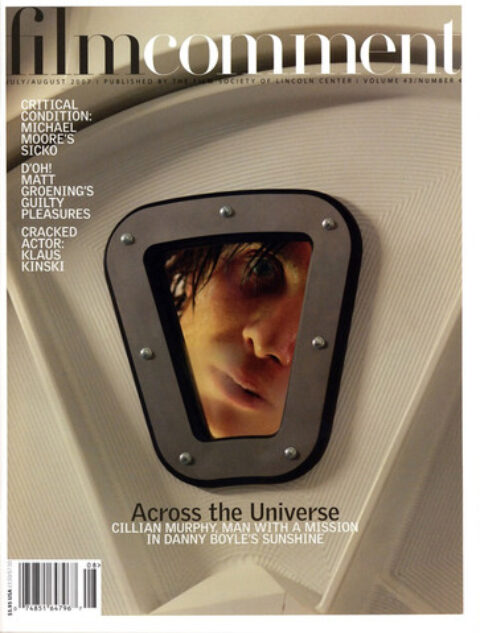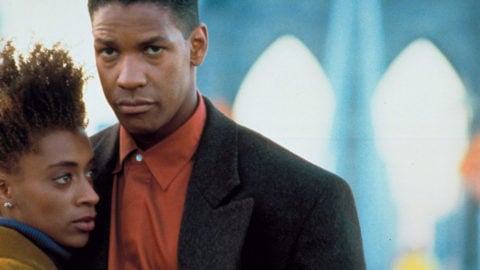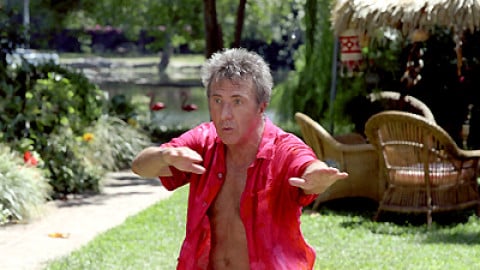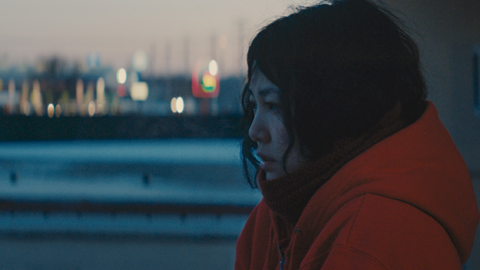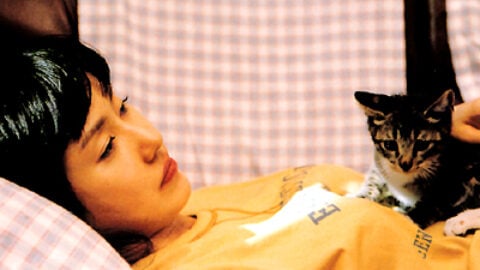Steve Buscemi’s career is an American spin-off of the sea change in acting wrought by Alec Guinness 50 years ago. Buscemi’s sourpuss “full-on human rat mode,” as Variety put it recently, ratchets down mythic-sized characters to everyday guys working their humdrum psychopathic cons in plain sight. His characters are the alchemy of turning tragedy into dark comedy. Buscemi stars in two new films, both of which premiered at Sundance this past January: Interview, which he also directed, and, 11 years after starring in Living in Oblivion, Tom DiCillo’s Delirious. Both films are about media corruption, with Buscemi playing journalists at opposite ends of the food chain. In Interview, a remake of the Dutch film made by Theo Van Gogh, who was murdered in 2004 by a Muslim fanatic, he’s a serious journalist who’s been sent as punishment to interview a celebrity-fluff actress (Sienna Miller) and agonizes about being inside the room. In Delirious he plays an oily paparazzo who’s outside and wants in.
There are endless things to say about Buscemi, closing in on 50 later this year—from his early days as a stand-up comedian in the East Village in the Eighties to his work both in front of and behind the camera on The Sopranos to his still unrealized dream project, an adaptation of William Burroughs’s Queer—and it’s a little odd interviewing him about Interview. In the real world, Buscemi is hard to reach, doesn’t do much publicity, wouldn’t meet in person—in short, the whole process of setting up the interview took on many of the trappings of how art and media have been derailed by celebrity culture, which of course is at the heart of Interview. Get him on the phone, or see him at Sundance responding to audience questions, however, and he’s a straight shooter, earnest and open. The face of the new independent and quasi-independent American cinema for nearly 20 years, he remembers where he came from when the gates finally swing open.

Interview
Before his death Theo Van Gogh was planning to remake Interview in English. Why did you step in?
I didn’t know his work at all. I just knew of him, and of course I knew about his murder in 2004. Bruce Weiss, the producer, called me about the project, explaining that Theo wanted to remake three of his own films in the States, and that they were trying to honor that using American directors. At first I was just curious to see the films… and I chose Interview; it was my favorite of the three.
What in particular about Interview resonated with you?
I liked the relationship between this journalist and the starlet. I liked all the comments that it made about celebrity and media, but even more I liked how it was like watching a couple going through a breakup even though they were just meeting for the first time. They only spend a few hours together.
Substance on parole meets Hollowness on parade… they collide. A take on present media culture.
I wasn’t trying to make any commentary on that per se. My character isn’t representative of all journalists, and Sienna’s character [isn’t of all actresses]. These are two very specific people. She’s a lot more than he bargained for. He really underestimates her, prejudges her, and she plays her hand very well.
Film is almost about the power of acting to disarm you.
She takes him up on his challenge and outsmarts him. You learn more about him in the film than you do about her, In fact you think she’s revealing a lot, or that he’s uncovering a lot, but he’s not.
Why did you make the changes you made from the original?
We decided to open it up. The original didn’t have the scene in the restaurant, the journalist went directly to her house. That really wouldn’t happen here on the first interview, unless he was doing a really long profile of her. Also, we were shooting here in New York, and it seemed a shame to have it all in one location. The journalist’s daughter in the original was younger, and we decided to make her older, practically the same age as Katya. We changed the diary, which in the original was a real diary to one that’s on the computer. There were little details like that because I didn’t want to copy the original step by step. I wanted to stay true to the spirit of the relationship, and also shoot it in their way Theo shot his later films with the three-camera method, mostly hand-held. We also used his Dutch camera crew and DP Thomas Kist. It was a real Dutch-American co-production.
Did the three-camera method pose a challenge?
Yeah, at first I thought one would be getting a close-up, one a medium and one a wide, but you really can’t do that or they’ll be getting in each other’s way. So you get three in close and pull out wider. The interesting thing was that Theo liked to shoot the close-ups first. The actors are rarely off-camera, so you have to do these really long takes and get all the coverage at once.
It took you nine days to do this. And Theo…
[sigh] He did it in like four or five nights. We did add a location. But in general he worked much faster than I do. Also because I was in it… It just takes longer.
There’s something at the heart of the film that is emblematic of a sea change in movies. At the heart of a lot of films is a question: who is this person sitting across from me? How did they come to be there? What’s the danger? What’s the pleasure? What’s the problem? What are they bringing with them? And finding that out has become a more important project than meeting some external challenge…
I’ve never been so interested in the three-act structure. I once took a screenwriting class before I decided to write Trees Lounge. I learned all of these formulaic steps. The teacher broke it down. What I came away with is that some of my favorite movies do that. But that structure is there organically. When you try to consciously replicate it, it doesn’t quite work. And I’ve never been much able to analyze films as to what makes them work, and what doesn’t. I remember Robert Altman being asked on a panel what films inspired him. He said it was all the bad films he watched. The good ones you really weren’t sure why they worked. But the bad ones inspire him to think, “Well, I could at least do better than that.”
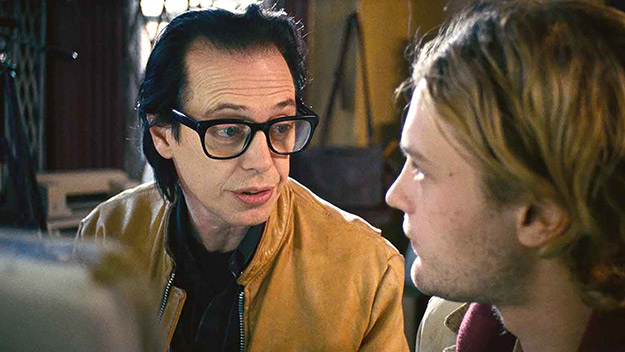
Delirious
Both Interview and Tom DiCillo’s Delirious are about media corruption. You play journalists in both, but at opposite ends of the spectrum. Interview is about a serious journalist who’s been downgraded to doing celebrity fluff and agonizing about being inside the room; and Delirious is about a sleazy paparazzo who’s obsessed with…
Trying to get inside the room.
Exactly! I saw both films at Sundance, one day apart. How did these two films work together or conflict when you made them?
Tom had been trying to get Delirious made for a few years, so it was on my mind a few years. I don’t think I was that conscious of the two films being connected. We made Delirious in December [’05], and I can’t remember if I had even been approached with Interview at that time. But it’s certainly something that struck me after the fact.
They both share European funding, Interview from the Netherlands, Delirious from Spain. Why is it that you and he and American indie filmmakers have to go to Europe to get funding?
The funding for Interview originally was supposed to come form Dutch money, but [laughs] that fell through. The bulk of the money we got later was Canadian. I don’t know why it’s so hard to raise money here for these types of films, it’s really unfortunate. In Europe and other places these films are just much more accepted, and there’s less of a difference between “independent” and studio films. It’s more that film is film. And I think there’s more of a respect for and interest in them.
You’ve certainly worked with directors who’ve been funded both by Hollywood and abroad. Jim Jarmusch (Mystery Train, Coffee and Cigarettes) goes to Germany, the Coens, Tarantino—I remember ’92 when you did both Reservoir Dogs and Alex Rockwell’s In the Soup… and Sundance turned its back at the time on Reservoir Dogs as too violent, while giving In the Soup the top prize.
And Reservoir Dogs started out in the Sundance labs. It was a film they were behind absolutely, but at that time it was a four-person jury and it just didn’t fly with the jury.
Are there directors you like working with? You’ve been at the heart of indie cinema. Who do you like working with and why?
Certainly everyone you mentioned. Going back to Alexandre Rockwell and In the Soup, I really learned a lot about responsibility, about how much responsibility he gives to actors as a director. He really allowed me to create that guy with him. Tom DiCillo does the same thing. I turned down the role in Delirious at first, because I couldn’t connect with the character. I thought he was too hard. And Tom really listened and worked with me and made it into something I could get my mind around. So, I really appreciate the fact that he stuck with me and didn’t just move on. Robert Altman—I was lucky to work with him on Kansas City right before I directed Trees Lounge, and I just loved the atmosphere he created on set. He made everyone feel like we were all in this together. He told me he didn’t care if the film made a nickel but wanted it to be successful on his terms. And then he corrected it and said, “On our terms.” I’ve never forgotten that. I’m lucky that I can make my living as an actor and be choosy about the films I direct and where the money comes from. And I have great role models like Jarmusch, Rockwell, and DiCillo, who really fight to… make their own films. And don’t compromise on the big stuff. Just to get anything up onscreen there’s a whole truck load of things you’re faced with, but in the end you have to decide “Am I compromising so much that I’m losing the original intent of what I wanted to do?’
You’ve made a career out of being the Demented Everyman.
Variety described you in Delirious as “In full-on human rat mode.” I don’t know how you feel about that but… I finally got to play a full-on rat in Charlotte’s Web.
In some ways I think of you as a deadpan comedian, actually. You could be Don Knotts redone for the modern era.
Well I started out doing standup and have always been interested in comedy. My whole life I’ve been told I resemble him. One of my favorite reviews for a play described me as “a deeply disturbed Don Knotts.”
In the underrated Con Air, which was about a planeload of prisoners, the joke about you was that you were the baddest of the bad and all you did was act naturally. You were nice, you were polite, and everybody was scared silly of you.
Everybody else in that film did the work for me—Ving Rhames, John Malkovich—the way they treated me, I didn’t have to act scary at all.
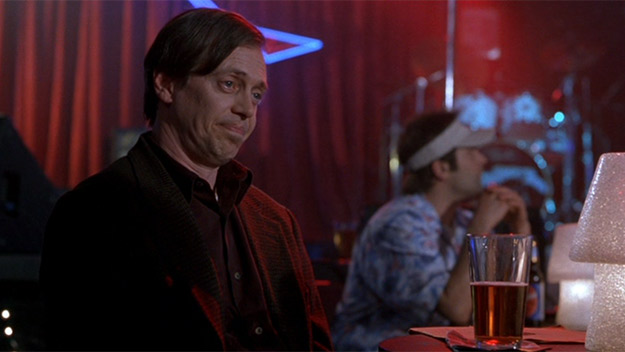
Ghost World
How was it when you carried a romantic lead in Ghost World?
I don’t know if [that character] is the traditional romantic lead… But it’s fun to get to do that sometimes… I like movies where I get to just sit and talk to the girl [pauses, laughs] and not necessarily be plotting to kill them.
Let’s talk about directing a bit. You directed one of my favorite films of 2000, Animal Factory. At the heart of that is something that courses through the other films you’ve directed: the rich somehow always manage to crawl over the backs of the workingman. It’s true of Trees Lounge, which is sort of like a Brooklyn c&w song: guy loses his job, his girl, his dog, ends up on a stool in a bar. And Lonesome Jim, where Casey Affleck plays a kid who can’t make it out into the world and comes home. The importance of all this is that it’s a real working-class milieu. Why is that important to you?
Because it’s where I come from. It is what I know. It’s where I’m comfortable. I don’t know that I’m consciously trying to make a statement about the working class; it’s just where I come from. I’m drawn to characters that have problems and are going through a struggle… These people are having a hard time, looking to make a connection, and when they do, what is it in them that will sometimes sabotage that?
You were born in Brooklyn?
Born in Brooklyn and grew up mainly in Long Island, from the time I was eight.
So you’re a kid growing up in Valley Stream and you think, “I wanna act.”
One of my Dad’s best friends was an actor… Peter Miller, grew up in East New York with my Dad, went to the Neighborhood Playhouse and made his way out to California. He was actually in Robert Altman’s first movie, The Delinquents. He was in The Blackboard Jungle. He was the student who tried to rape the schoolteacher and was beaten up by Glenn Ford. He did a number of films, then retired, became an investment baker, then went back into it. He was later a soap opera actor. So I did have someone in the family… this was not a blood relative, but we called him Uncle Pete… who made it. My grandfather, who I never met, was a singing waiter in Coney Island with Jimmy Durante. My Uncle Pete was some sort of model to follow, which is why I went to the Lee Strasberg school. Other than that, I really didn’t know anything about the world of theater. My main interest was comedy. I tried doing standup for a couple years but didn’t like the solitude of it. By that time I was living in the East Village and meeting Rockets Redglare and Mark Boone, Junior, and we all started working together, writing and performing our own material. That was the genesis of me becoming a writer and director, sort of by default. We just wanted to create our own work as actors.
What kind of work did your dad do?
He was a sanitation worker for 30 years.
Did your mom work?
She was a hostess at a Howard Johnson’s for about five years, but mainly she raised four boys.
A sanitation worker gets good pay in exchange for reduced status and a great pension. And your dad lived with that.
Yeah, and having a civil-service job was really impressed upon me and my brothers. When we all turned 18 we were made to take whatever civil service test was available. For me it was the Fire Department. It took them four years to get to my number on the list. By that time I was living in the city, and I decided to take the job. And I did that for four years… Engine Company 55 in Little Italy.
Was your dad proud?
Oh, absolutely. He was really shocked when I said I was leaving. At that time I left, I’d made only one film, Parting Glances, that hadn’t been released yet. I was banking on that to sort of jumpstart my nonexistent film career. [laughs] In his eyes, it was a really risky thing to do. In my eyes it seemed like the right thing to do. Looking back on it, I can see that it was pretty risky. So many good films fall through the cracks, don’t get a distributor. I was really lucky with Parting Glances… and I still love it. It’s just been restored by OutFest, and they’re having a screening of it in L.A. July 16. It was from that film that I was able to get noticed, get an agent, and really started the ball rolling.
Having worked as a fireman for four years, 9/11 must have affected you more than it did most of us…
Yeah… When I learned the number of casualties, the first number that came in was like a 100 fire fighters. And that’s what made it real. The other numbers of civilian deaths was so surreal to me I couldn’t wrap my head around it. But when the numbers started coming in of firefighters, and guys that I knew and worked with, that’s what made it very real for me.
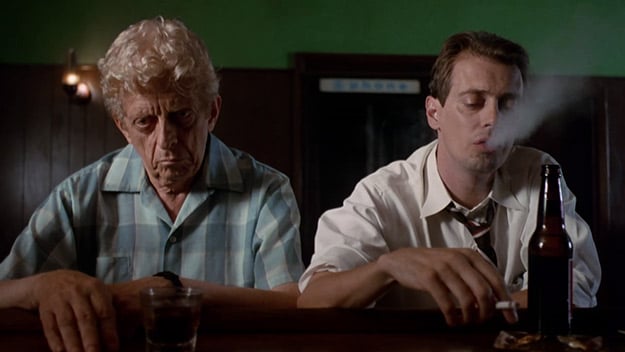
Trees Lounge
Did you go down to the engine company?
Yeah, I went the next day to my firehouse, just to get information, and ran into a firefighter friend of mine, and he told me that they had lost five guys. Then he drove me into the site. I went there with my old gear, and I walked around for a couple of hours and found my company. I worked with them that day and the next four or five days.
What kind of stories are you thinking about telling? Has that changed over time?
No, not really. One script we’ve trying to get off the ground since before 9/11 is based on the William Burroughs book Queer… Every few years we get some new leads. It’s very difficult to raise funding here for a film like that, even though a lot of people say they love the script. But in the end they’re not willing to take the risk.
That suggests I Now Pronounce You Chuck and Larry.
There ya go, one of my favorite guys: Adam Sandler. I love what it’s about: two firefighters who for insurance purposes decide to get married and pretend that they are gay. They try to do it on the sly, but of course it gets out in the open and they really have to pretend that they are gay even to the guys in the firehouse because they don’t want to implicate anybody else… I play the city inspector who is suspicious and is trying to out them as being straight… It’s a very funny and commercial gay-rights film.
How was directing The Sopranos different than directing your films? Was it fun?
Yeah, it was fun… By the time I came into it, it was the third season and it was a really well oiled machine, working with the best actors available. It’s different from making your own film where you are in charge of how the whole thing is going to look. On The Sopranos you are working for a filmmaker, David Chase, who I think is a brilliant filmmaker. It was really an honor to have been a part of that as an actor and directing four episodes.
It’s a little odd interviewing you for Interview, actually. You don’t do a lot of press.
It’s not my favorite aspect of this business, that’s for sure… It’s also the number of interviews that are required these days to promote an independent film… This is the only interview I’m doing today, so it’s okay. It’s when you’re doing a lot in a row, after a while the experience just gets surreal. You find yourself saying the same things, and wondering if you’re repeating yourself within the same interview. It just gets bizarre. And also you just get tired of hearing yourself talk. It’s hard to keep yourself engaged. That’s the reason I tend to shy away from it.



